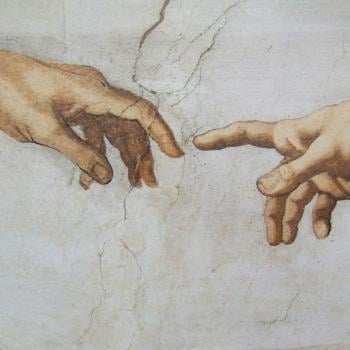![By anonimus (http://days.pravoslavie.ru/Images/im2463.htm) [Public domain], via Wikimedia Commons](https://wp-media.patheos.com/blogs/sites/637/2016/08/hymns-1-226x300.jpg)
Just as Mary mediates our yes to God, and all that she has accomplished is handed over to Jesus who makes it his own and raises it higher through himself, so we find that Jesus sends grace back down, from himself, through her; she is the one who connects us to Jesus. Humanity flows through her to Jesus, just as grace flows from Jesus to us through her. It is in this fashion that we are to understand how she is co-mediator; she mediates our humanity to Christ and through that mediation, she becomes the gateway which connects us to Jesus. This is why it can be said that no one comes to Jesus except through her, because it is through her we are united to him for through her he united himself to us.
We must keep in mind that the key to understanding Mary is Jesus and his work. He is the focus. It is because of what he has done that her role is important:
We are then, it will be seen, very far from attributing to the Mother of God a productive power of grace – a power which belongs to God alone. Yet, since Mary carries it over all in holiness and union with Jesus Christ, and has been associated by Jesus Christ in the work of redemption, she merits for us de congruo, in the language of theologians, what Jesus Christ merits for us de condigno, and she is the supreme Minister of the distribution of graces.[1]
This is beautifully revealed in Mary’s Magnificat. While she speaks as to what God has done with her, and so it is about her, it is nonetheless focused on God as the actor: “for he who is mighty has done great things for me, and holy is his name” (Lk 1:49). What God has done for her is not just for her own glorification, but the answering of her prayers, the recognition of the desires of her pure heart for the whole of humanity:
And his mercy is on those who fear him from generation to generation. He has shown strength with his arm, he has scattered the proud in the imagination of their hearts, he has put down the mighty from their thrones, and exalted those of low degree; he has filled the hungry with good things, and the rich he has sent empty away. He has helped his servant Israel, in remembrance of his mercy, as he spoke to our fathers, to Abraham and to his posterity for ever (Lk 1:50-55 RSV).
Mary equates the great things God has done for her with the great things God has done for humanity. She desires the grace of God to be poured out over humanity, and this is exactly what she sees being accomplished through her. Grace pours out upon her, and from, throughout the whole of humanity. What had been done in Israel had been done for the sake of her. What is done in the world, because of Christ, is done through her because Christ is born from her. This is what we get from the Magnificat. God listens to her pleas, and he pours out grace, never forgetting his servants, reminded as he is about them by Mary herself:
So, as the Virgin Mother is incomparably greater than all, as many as will share in God will do so through her, and as many will know God will acknowledge her as the one who contained Him who cannot be contained, and as many will extol God will hymn her, too, after Him. She is the reason for everything which preceded her, the protectress of everything which came after, and the cause of eternal blessings. [2]
We must remember this privilege is given to Mary not only because of her personal holiness, but also because she has become our spiritual mother. She intercedes for us to Jesus as his mother and ours. As we see in the Wedding of Cana, what she implores, Jesus accomplishes. She implores him to help us, her spiritual children, because she loves us as a mother should. She seeks to release us from our burdens, as Paul said parents should (cf. 2 Cor. 12:14). We have been given to her so we are a part of her household, the household of God. She mediates grace to us as a fulfillment of the demands of charity: “If any one does not provide for his relatives, and especially for his own family, he has disowned the faith and is worse than an unbeliever” (1Tim.5:8 RSV). How could we think the pure, most holy Mother of God would disregard us and not help us as she could? If we are wise, we could not. “A wise son makes a glad father, but a foolish man despises his mother” (Prov.15:20). She mediates to Jesus for us, and the grace of God comes through such mediation, helping us to be saved. This grace is often revealed in and through miracles, just as it did in Jesus’ ministry, explaining why so many miracles are associated with Mary and the saints.
As Mother of the Lord and spiritual mother of all of us, Mary is the link which makes Christ’s humanity real. He is truly human. All of this is because of Mary. She is special to God, and so her requests for us merit special attention. She seeks our spiritual benefit, and with it, will seek our material aid if she believes there is a just cause for such a gift. She does so as a mother, looking after us as a mother does, mediating on our behalf when she finds it appropriate, but denying the request when she knows it would hinder our spiritual well-being. Her role is at the center of the divine drama on earth, which puts her right next to her son, Jesus, as St. Edith Stein beautifully explained:
The title of Mary as our mother is not merely symbolic. Mary is our mother in the most real and lofty sense, a sense which surpasses that of earthly maternity. She begot our life of grace for us because she offered up her entire being, body and soul, as the Mother of God.
That is why an intimate bond exists between Mary and ourselves. She loves us, she knows us, she exerts herself to bring each one of us into the closest possible relationship with the Lord – that which we are above all supposed to be.[3]
More to Come
[1] St. Pius X, Ad Diem Illum, ¶14. de condigno merit is essential merit of justice, which is demanded by necessity, while de congruo merit is the secondary honors or rewards, based already on being in the state of grace first; de congruo merit is the bounty of grace, not the condition for it to be established.
[2] St. Gregory Palamas, The Homilies. trans. Christopher Veniamin (Waymart, PA: Mount Thabor Publishing, 2009), 432.
[3] St. Edith Stein, “Church, Woman and Youth” in Edith Stein. Collected Works. Volume 2. Woman. trans. Freda Mary Oben, Ph.D. (Washington, DC: ICS Publications, 1996), 240-1.
Stay in touch! Like A Little Bit of Nothing on Facebook:
A Little Bit of Nothing













